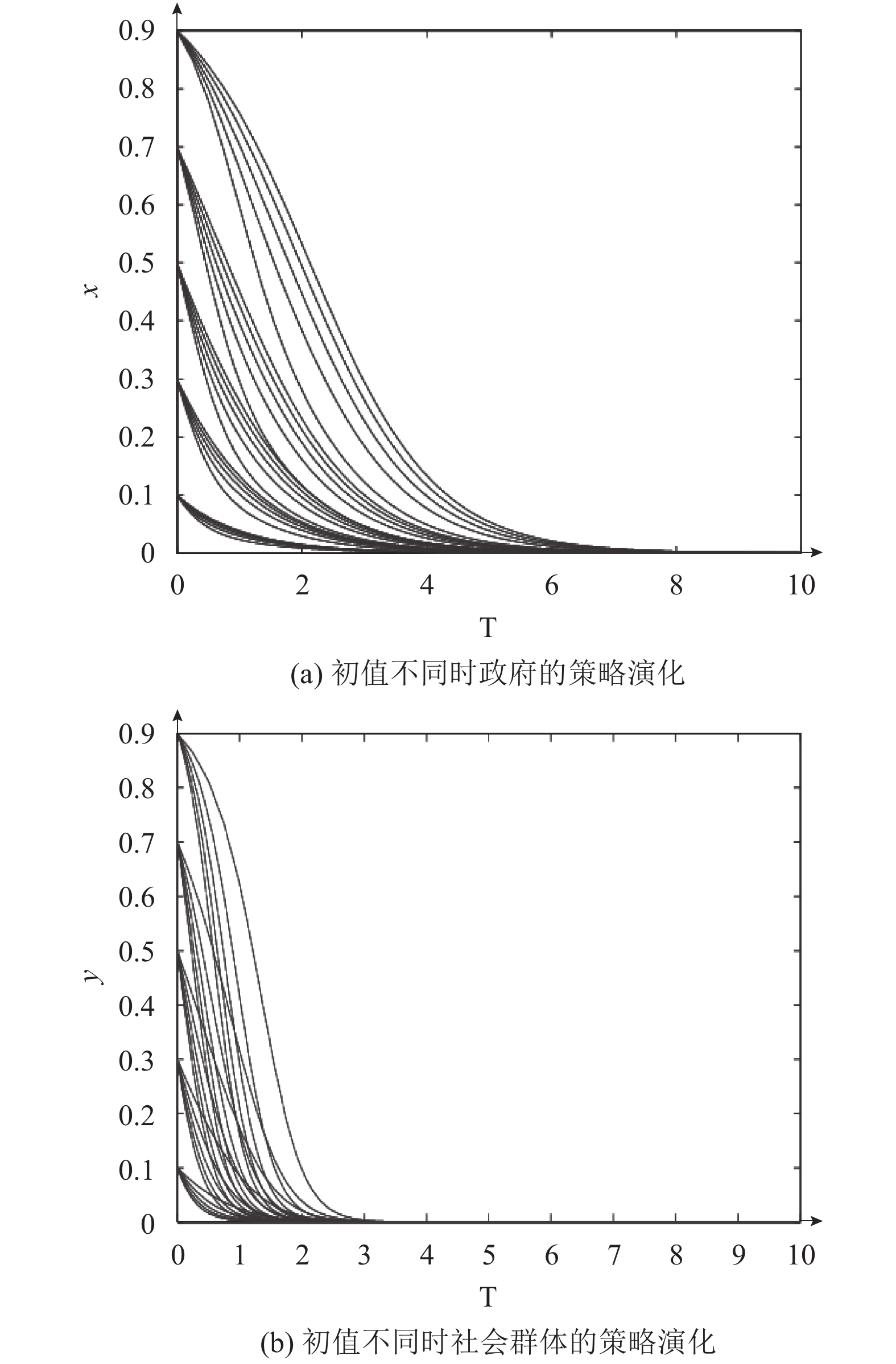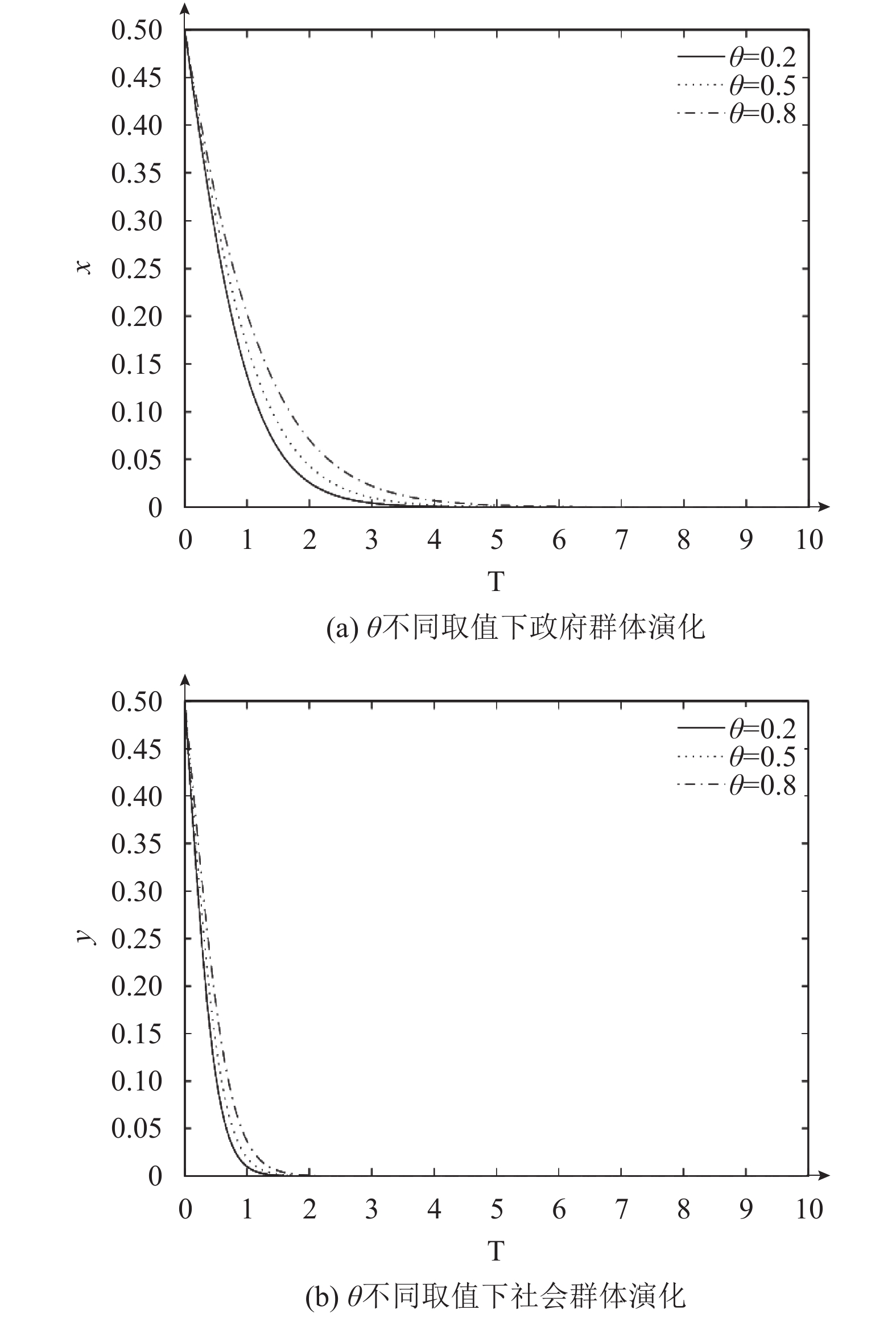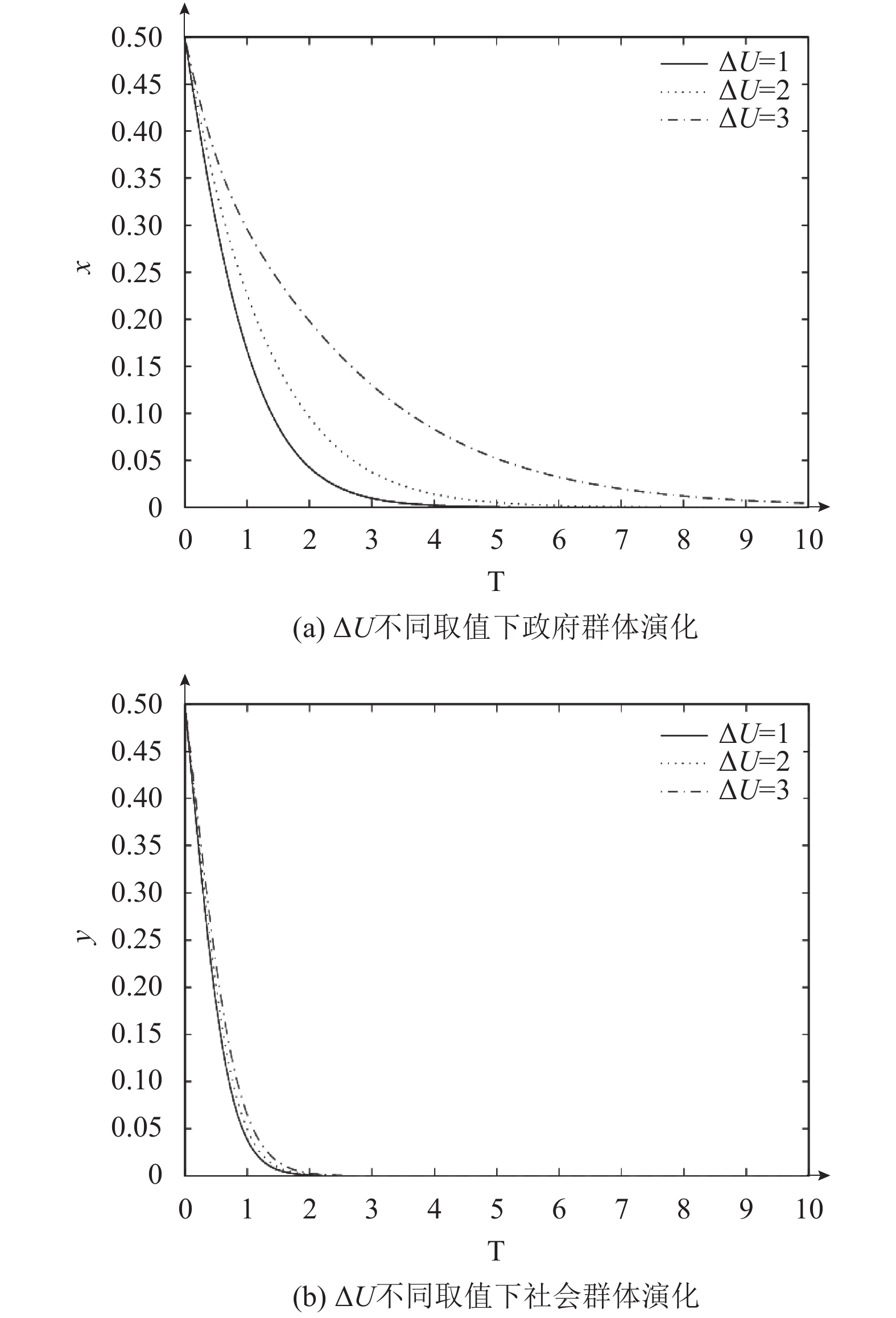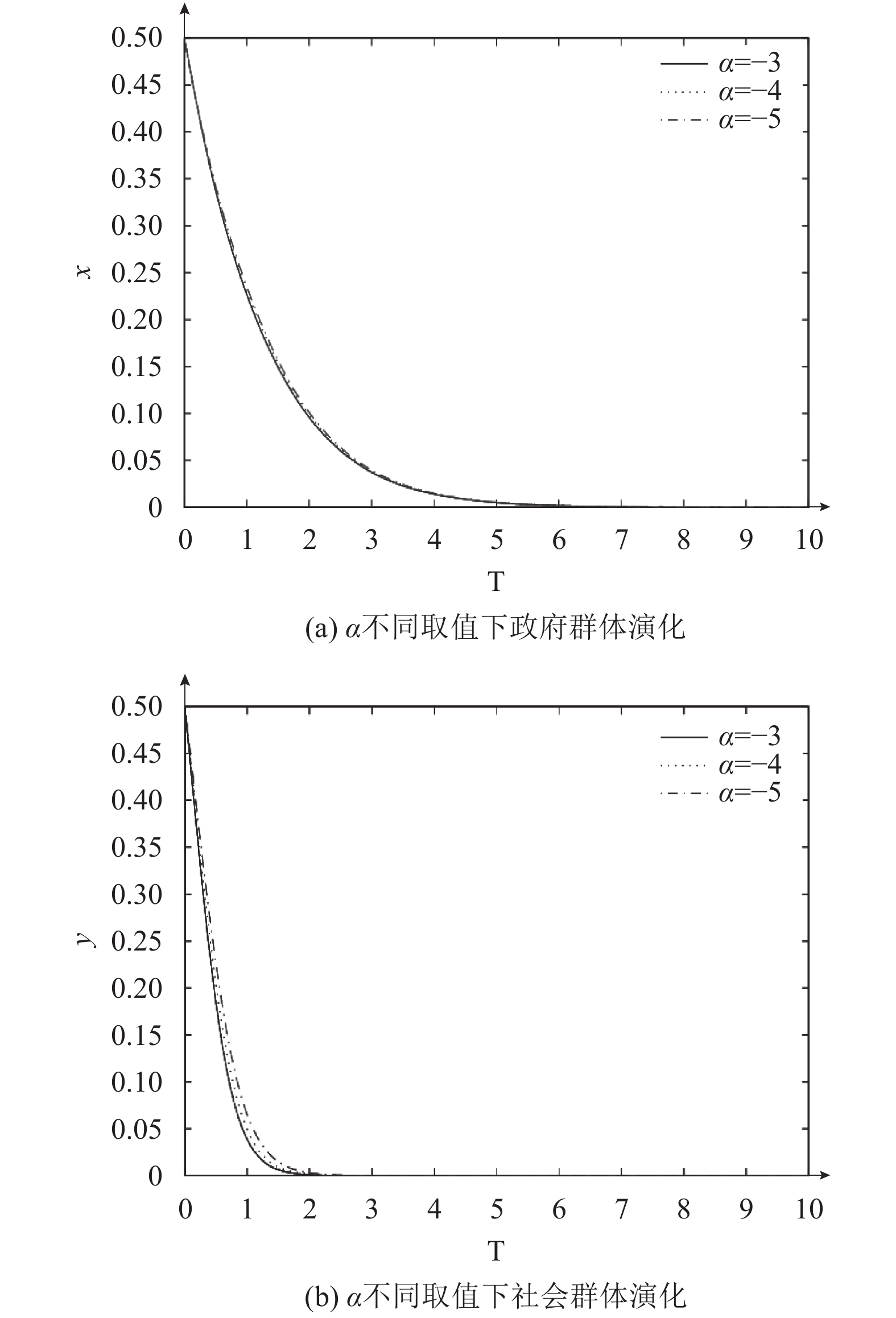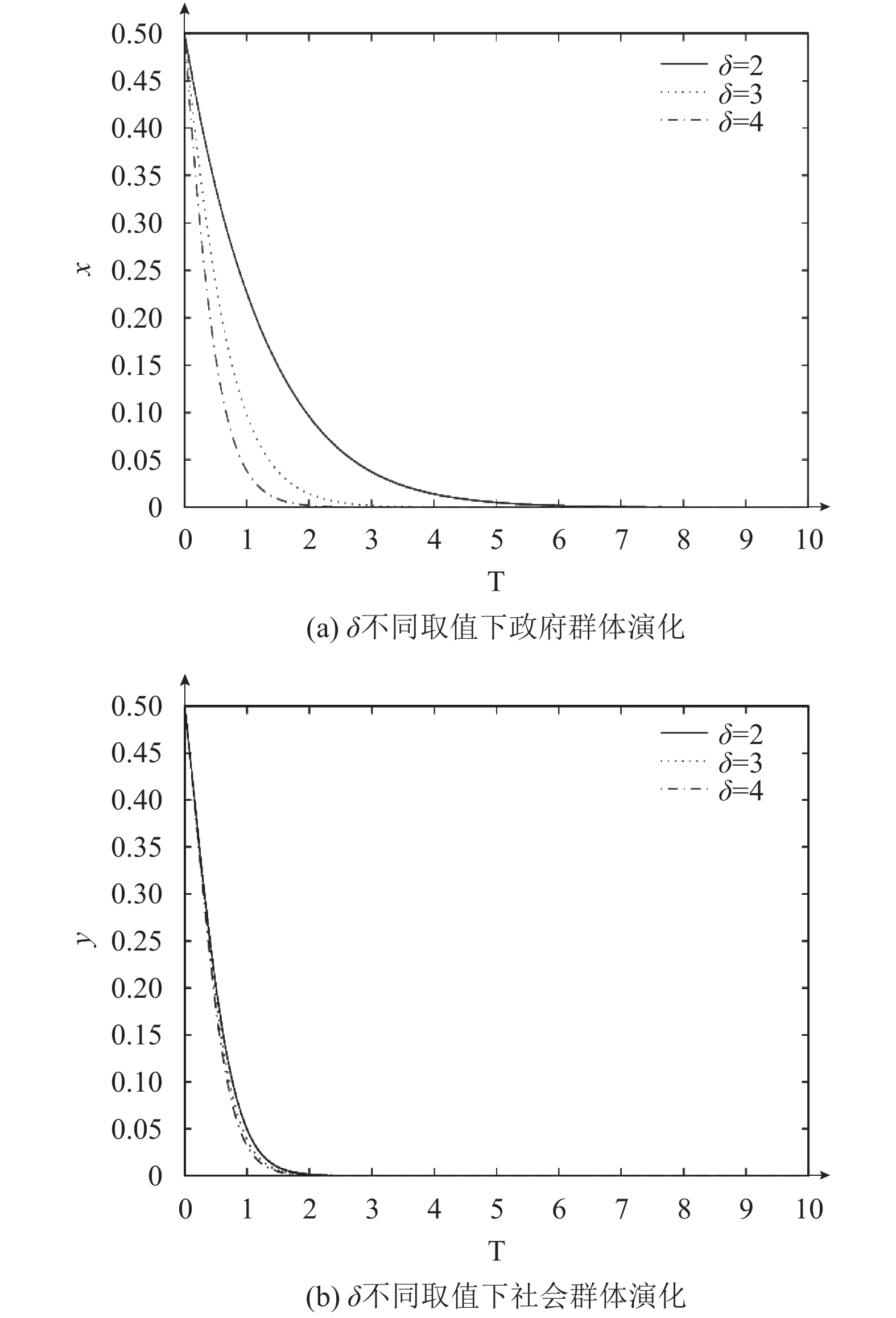Evolved Gambling Analysis of Indirect Conflicts of Interests Based on Heterogeneity in the Population
-
摘要: 社会发展过程中利益分配的不公使得弱势群体的相对剥夺感、不满意感增强,加之利益诉求表达渠道不畅,社会安全阀机制缺失,群体情绪多选择借机发泄,致使群体性事件日益呈现非直接利益冲突的特征。对此,基于演化博弈理论展开研究。考虑到社会群体异质性特征,引入了非直接利益相关者子群,构建政府与社会群体策略演化博弈模型,研究异质群体行为逻辑和策略均衡,仿真分析政府与社会群体协商合作的情景演化,提出非直接利益冲突事件应对的策略建议。Abstract: Vulnerable groups feel deprived and unsatisfied caused by unjust distribution of interests in the development of the human society. More indirect conflicts of interests occur because of the ineffectiveness of the channels of interest expression and the lack of mechanism of the social relief valve. The evolutionary game model about behavior of the government and social groups is established, taking into account the heterogeneity of social group and indirect stakeholders. Behavior logic and strategy equilibrium of heterogeneous group are discussed. Evolutionary scenarios of the behavior of government and social groups are analyzed by means of simulation. Strategies to deal with indirect conflicts of interests are given.
-
Keywords:
- heterogeneity /
- indirect conflicts of interests /
- mass incident /
- evolutionary game
-
引言
随着中国经济体制改革的逐步深化,利益格局剧烈变动和调整,旧的社会结构断裂,新的社会结构尚未成型,导致利益群体诉求显化,社会风险积聚,群体性事件频发。社会转型的加速与改革红利分配的不均所带来的群体间差异为人们所感知,造成社会心态失序,浮躁、宣泄、冷漠、怨恨、仇视、暴力等负面心态蔓延[1]。贫富差距加大、社会风气不正、官员腐败等不良现象的集中涌现,引起公众的不满,激化了社会群体矛盾。尤其是处于弱势的草根阶层的权益得不到保障,相对剥夺感强烈,对社会的不满情绪骤增,加之利益诉求的制度化表达机制缺失,情绪表达诉诸非理性、甚至暴力,群体性事件日益呈现非直接利益冲突的特征[2]。例如云南孟连事件、江苏启东事件、四川什邡事件,以及近期的一系列PX事件中,均有非直接利益相关者参与的身影。
非直接利益冲突指社会群体性事件的参与者除了与事件直接相关的利益诉求者之外,还包括诸多与事件本身无关,也非引发事件的参与者,参与冲突只是其表达、发泄情绪的一种行为[3]。基于权力财富信息等社会稀缺资源的分配方式,社会形成了强势与弱势区隔的异质性群体[4]。群体性事件的起因多为弱势群体追求公平的经济利益而引发的集体行动,最初的参与者完全出于明确的利益诉求,是事件的直接利益相关者。直接利益相关者通过正常渠道表达的诉求,但未得到强势群体的及时回应,不满情绪压抑、积累,加剧了社会群体的结构性紧张,激发了非直接利益相关者的情感共鸣,形成反抗强势群体的共同信念,非制度化表达诉求,激化群体性事件冲突。非直接利益相关者与直接利益主体的诉求关联不大甚至无关,介入群体性事件多为激情式参与,以借机发泄对社会的不满情绪。非直接利益主体的介入使得群体性事件偏离了利益诉求的初衷,放大了事件规模效应和影响力,破坏性更强,甚至危及社会和谐与稳定。因此,研究非直接利益冲突事件的演化机理,分析异质群体行为逻辑,对于预防和消弭群体性事件风险、减少社会损失、维护社会安定具有重要意义。
一、 相关研究述评
针对群体性突发事件的诱因、分类、演化机制和应对等问题,国内外学者从不同学科角度展开研究。群体具有易感染、不可征服感、传染性特征,使得个体产生群体依赖盲从心理,易导致羊群行为或过激的集体行动[5]。为此Park等学者基于群体互动视角,认为群体性事件是个体在受到群体行为影响时失去理智的非理性集群行为过程[6]。Bethwaite等人基于实验博弈探讨了群体性事件的产生机理,认为利益分配的公平感是引发弱势群体非理性集群行为涌现的一个重要因素[7]。于建嵘基于群体性事件的诉求导向,将群体性事件划分为维权抗争、社会纠纷、社会泄愤和有组织犯罪等4种类型[8]。王循庆等通过多案例分析方法提取群体性事件的属性,结构化描述群体性事件演化过程属性,构建群体性事件演化的随机Petri网模型和等价马尔科夫链模型,分析群体性事件的均衡状态和变动规律[9]。汪伟全以环境类群体性事件为切入点研究群体性事件的演化机理,提出群体风险放大是环境类群体事件暴力抗争的逻辑起点,事件的演化历经不满情绪形成、持续发酵、焦点事件和冲突与对抗4个阶段[10]。于鹏、张扬分析环境群体性事件利益相关者关系和动态发展过程,提出环境群体性事件的“一案三制”和分类型、分阶段的处置机制[11]。Borch针对群体性事件的参与者的有限理性特征,指出应对群体成员的负面情绪进行疏导[12]。网络社会背景下,社交媒介为社会主体的诉求表达、情绪宣泄提供了新的渠道,群体性事件应对中应充分重视社交媒介的作用[13]。
已有研究多是针对群体性事件的定性分析,以群体性事件演化机理为对象的定量研究较少,且多是基于博弈论的群体性事件主体策略分析。Lo等构建了群体性事件主体行为选择的非合作博弈模型,将博弈主体的备选行为视为策略集,基于混合策略下的纳什均衡解析群体行为的涌现机理[14]。Liu等建立政府与社会群体的行为博弈模型,基于模型的Nash均衡分析政府不同应急处置策略下的主体行为演化[15]。刘德海、徐寅峰、罗成琳等基于利益博弈视角,对群体性事件的产生机理、演化过程和处置策略等问题进行了研究[16~18]。基于传统博弈的研究通常是从静态视角出发,且超理性假设的局限与群体性事件中主体的有限理性不符。演化博弈理论基于行为主体的有限理性假设,将主体行为抽象为具有适应性学习能力的渐进演化过程,为深入研究群体性事件演化过程中的主体行为交互提供理论工具。Liu等针对网络群体性事件舆论的传播过程,构建舆论传播的演化博弈模型,指出政府可以通过信息披露控制信息传播与交流,引导舆论方向[19]。王循庆等针对群体性事件中异质群体的利益博弈,构建强势和弱势两类群体策略选择的演化博弈模型,并考虑上级政府惩罚机制的影响,对比分析两类群体策略的演化稳定均衡[20]。郑君君等针对相关主体的利益冲突,构建环境群体性事件的演化博弈模型,研究群体间存在信息交互时监管部门的舆情引导策略对环境群体性事件演化的影响[21]。刘德海、陈静锋基于“信息传播–利益博弈”的协同演化视角,构建了环境群体性事件的协同演化博弈模型,并通过了多主体的社会仿真分析事件的协同演化路径[22]。
综上所述,现有研究多从静态分析视角出发,研究侧重于群体性事件的诱因及控制策略,群体性事件演化机理问题的研究还处于起步阶段,政府与社会群体的利益博弈是当前研究的重点,但研究尚未涉及社会群体内部的主体异质性问题。基于此,本文从动态的微观视角,基于演化博弈理论,研究非直接利益冲突的群体性事件中群体策略演化,考虑社会群体中直接利益相关者和非直接利益相关者两类异质主体的不同利益诉求,建立政府与社会群体行为的策略演化博弈模型,分析异质主体行为策略的演化稳定均衡,为群体性突发事件的应对提供决策支持。
二、 非直接利益冲突事件演化博弈模型
(一) 问题描述
This page contains the following errors:
error on line 1 at column 1: Start tag expected, '<' not foundBelow is a rendering of the page up to the first error.
This page contains the following errors:
error on line 1 at column 1: Start tag expected, '<' not foundBelow is a rendering of the page up to the first error.
This page contains the following errors:
error on line 1 at column 1: Start tag expected, '<' not foundBelow is a rendering of the page up to the first error.
This page contains the following errors:
error on line 1 at column 1: Start tag expected, '<' not foundBelow is a rendering of the page up to the first error.
This page contains the following errors:
error on line 1 at column 1: Start tag expected, '<' not foundBelow is a rendering of the page up to the first error.
根据以上假设,可得政府群体与社会群体的支付矩阵,见表1。
表 1 支付矩阵政府 社会 利益相关者 利益无关者 抗争 妥协 抗争 妥协 强硬 $U - \Delta V - {c_{g1}} - \delta $ ,
$V + \Delta V - {c_v}$ 
$U + \Delta U - \delta $ ,
$V - \Delta U$ 
$U - {c_{g2}} - \delta $ ,
$W + \Delta W - {c_w}$ 
$U - \delta $ ,
$W$ 
协商 $U - \Delta V - {c_{g1}}$ ,
$V + \Delta V - {c_v} - \rho $ 
$U$ ,
$V$ 
$U - {c_{g2}}$ ,
$W + \Delta W - {c_w} - \rho $ 
$U$ ,
$W$ 
(二) 模型构建
This page contains the following errors:
error on line 1 at column 1: Start tag expected, '<' not foundBelow is a rendering of the page up to the first error.
${\Phi _1} = \theta [y(U - \Delta V - {c_{g1}} - \delta ) + (1 - y)(U + \Delta U - \delta )] + (1 - \theta )[y(U - {c_{g2}} - \delta ) + (1 - y)(U - \delta )]$

采取协商策略的期望收益为
${\Phi _2} = \theta [y(U - \Delta V - {c_{g1}}) + (1 - y)U] + (1 - \theta )[y(U - {c_{g2}}) + (1 - y)U]$

则政府的平均收益为
$\bar \Phi = x{\Phi _1} + (1 - x){\Phi _2}$

根据演化博弈理论可得政府的复制动态方程
${\rm{d}}x/{\rm{d}}t = x({\Phi _1} - \bar \Phi ) = x(1 - x)({\Phi _1} - {\Phi _2})$

社会群体采取抗争策略的期望收益为
${\Psi _1} \!=\! \theta [x(V \!+\! \Delta V \!-\! {c_v}) \!+\! (1 \!-\! x)(V \!+\! \Delta V \!-\! {c_v} \!-\! \rho )] \!+\! (1 \!-\! \theta )[x(W \!+\! \Delta W \!-\! {c_w}) \!+\! (1 \!-\! x)(W \!+\! \Delta W \!-\! {c_w} \!-\! \rho )]$ 
采取妥协策略的期望收益为
${\Psi _2} = \theta [x(V - \Delta U) + (1 - x)V] + (1 - \theta )[xW + (1 - x)W]$

则社会群体的平均收益为
$\bar \Psi = y{\Psi _1} + (1 - y){\Psi _2}$

根据演化博弈理论可得政府的复制动态方程
${\rm{d}}y/{\rm{d}}t = y({\Psi _1} - \bar \Psi ) = y(1 - y)({\Psi _1} - {\Psi _2})$

由此可得演化博弈的二维动力系统
$\left\{ \begin{gathered} {\rm{d}}x/{\rm{d}}t = x(1 - x)[\theta \Delta U - \delta - y\theta \Delta U] \\ {\rm{d}}y/{\rm{d}}t = y(1 - y)[\gamma x + \theta \alpha + (1 - \theta )\beta ] \\ \end{gathered} \right.$

This page contains the following errors:
error on line 1 at column 1: Start tag expected, '<' not foundBelow is a rendering of the page up to the first error.
(三) 均衡点及其稳定性分析
This page contains the following errors:
error on line 1 at column 1: Start tag expected, '<' not foundBelow is a rendering of the page up to the first error.
$J = \left[ {\begin{array}{*{20}{c}} {(1 - 2x)(\theta \Delta U - \delta - y\theta \Delta U)}&{ - \theta \Delta Ux(1 - x)} \\ {\gamma y(1 - y)}&{(1 - 2y)[\gamma x + \theta \alpha + (1 - \theta )\beta ]} \end{array}} \right]$

雅可比矩阵的行列式
$\det J = (1 - 2x)(1 - 2y)(\theta \Delta U - \delta - y\theta \Delta U)[\gamma x + \theta \alpha + (1 - \theta )\beta ] + \theta \gamma \Delta Uxy(1 - x)(1 - y)$

雅可比矩阵的迹
${\rm{tr}}J = (1 - 2x)(\theta \Delta U - \delta - y\theta \Delta U) + (1 - 2y)[\gamma x + \theta \alpha + (1 - \theta )\beta ]$

This page contains the following errors:
error on line 1 at column 1: Start tag expected, '<' not foundBelow is a rendering of the page up to the first error.
表 2 演化系统均衡点处行列式和迹均衡点 detJ trJ (0,0) $(\theta \Delta U - \delta )[\theta \alpha + (1 - \theta )\beta ]$ 
$(\theta \Delta U - \delta ) + \theta \alpha + (1 - \theta )\beta $ 
(0,1) $\delta [\theta \alpha + (1 - \theta )\beta ]$ 
$ - \delta - [\theta \alpha + (1 - \theta )\beta ]$ 
(1,0) $ - (\theta \Delta U - \delta )[\gamma + \theta \alpha + (1 - \theta )\beta ]$ 
$ - (\theta \Delta U - \delta ) + [\gamma + \theta \alpha + (1 - \theta )\beta ]$ 
(1,1) $ - \delta [\gamma + \theta \alpha + (1 - \theta )\beta ]$ 
$\delta - [\gamma + \theta \alpha + (1 - \theta )\beta ]$ 
( ${x^*},{y^*}$ )
$\displaystyle\frac{\delta }{{\theta \gamma \Delta U}}(\delta - \theta \Delta U)[\theta \alpha + (1 - \theta )\beta ][\gamma + \theta \alpha + (1 - \theta )\beta ]$ 
$0$ 
This page contains the following errors:
error on line 1 at column 68: Extra content at the end of the documentBelow is a rendering of the page up to the first error.
表2This page contains the following errors:
error on line 1 at column 1: Start tag expected, '<' not foundBelow is a rendering of the page up to the first error.
This page contains the following errors:
error on line 1 at column 1: Start tag expected, '<' not foundBelow is a rendering of the page up to the first error.
This page contains the following errors:
error on line 1 at column 1: Start tag expected, '<' not foundBelow is a rendering of the page up to the first error.
综合以上分析,可得如下结论:
结论1,社会群体的策略选择与政府的策略选择无关,只与社会群体的预期收益有关。当社会群体采取抗争策略的预期收益为正时,无论政府采取何种策略,抗争都是社会群体的占有策略;反之,选择妥协是社会群体的占有策略。
结论2,预期正收益是政府采取强势策略的必要非充分条件。当政府采取强势策略的预期收益为正时,若社会群体的占优策略为抗争,则经过一定时期的演化,政府更加倾向于协商策略。
结论3,当且仅当政府采取强势策略的预期收益和社会群体采取抗争策略预期收益均为负值时,O(0,0)为ESS。
以上结论表明,若社会群体对政府的不满意度或不信任感较强,认为只有“把事情闹大”引起更高级别政府的关注才能保证自身的利益诉求得到满足,往往会引发政府与社会群体的冲突。为避免社会冲突事件的发生,政府应尽量回避强硬措施,采取协商策略;多数情况下,政府都不宜采取强硬策略,只有当政府确保有能力控制事态发展时,采取强硬策略才是占优策略。无论何种情形下,政府强硬社会抗争的对抗策略都不是博弈双方的优势选择;只有当政府和社会群体意识到互相对抗对双方都不利时,政府与社会群体才会走向理想的协商与合作结局。
三、 演化情景仿真分析
This page contains the following errors:
error on line 1 at column 1: Start tag expected, '<' not foundBelow is a rendering of the page up to the first error.
(一)群体策略初始状态对系统演化的影响
This page contains the following errors:
error on line 1 at column 1: Start tag expected, '<' not foundBelow is a rendering of the page up to the first error.
This page contains the following errors:
error on line 1 at column 1: Start tag expected, '<' not foundBelow is a rendering of the page up to the first error.
This page contains the following errors:
error on line 1 at column 1: Start tag expected, '<' not foundBelow is a rendering of the page up to the first error.
This page contains the following errors:
error on line 1 at column 1: Start tag expected, '<' not foundBelow is a rendering of the page up to the first error.
This page contains the following errors:
error on line 1 at column 1: Start tag expected, '<' not foundBelow is a rendering of the page up to the first error.
This page contains the following errors:
error on line 1 at column 1: Start tag expected, '<' not foundBelow is a rendering of the page up to the first error.
This page contains the following errors:
error on line 1 at column 1: Start tag expected, '<' not foundBelow is a rendering of the page up to the first error.
This page contains the following errors:
error on line 1 at column 1: Start tag expected, '<' not foundBelow is a rendering of the page up to the first error.
This page contains the following errors:
error on line 1 at column 1: Start tag expected, '<' not foundBelow is a rendering of the page up to the first error.
仿真分析表明,社会群体以自身的预期收益为行为依据,只要采取抗争策略的预期收益为负值,选择妥协都是严格占优策略。对社会群体抗争的惩罚并非有效的措施,采取适度的惩罚威胁,使社会群体意识到非理性抗争并非一定能带来正收益即可起到期望效果,过度惩罚可能会激起社会群体的不满情绪。虽然当前的博弈系统中社会群体异质子群的比例对策略演化影响不显著,但若非直接利益相关者占比足够多,则可能使博弈主体及其利益诉求发生改变,突破本文博弈系统的边界,引发羊群效应,产生新的非理性群体行为。在非直接利益冲突事件的应对中,降低政府采取强硬策略可能获得的预期收益、提高政府采取强硬策略的声誉损失,有助于政府与社会群体的协商合作。此外,政府应尽量避免采取强硬策略,优先考虑协商策略,促进博弈双方协商合作的达成。
四、 非直接利益冲突事件应对策略建议
首先,加强对政府与社会群体行为的制度约束。建立群体性事件应对处理的法律法规体系,对政府和社会群体形成普遍的约束力和强制力。改革政府绩效考核制度,加强对政府声誉、公信力等指标的考核,鼓励政府积极与社会群体沟通协商,规避强硬策略带来的政府声誉、公信力下降,促使政府部门作风转变,提高问题解决能力。建立谈判协商机制和监督惩罚机制,基于平等与法制框架解决利益冲突,严厉惩罚打砸抢等非理性暴力行为,提高群体非理性抗争成本,引导社会群体行为的理性化和诉求表达的合法化。
其次,规范化社会群体诉求表达。利益诉求表达渠道不畅,民意缺乏出口,是社会群体事件频发的情境原因。长期以来,社会发展过程中利益分配的不公平使得弱势群体的失意、不满、愤怒等情绪骤增,加之利益表达渠道堵塞导致弱势群体争取自身权益时产生高成本高风险,群体情绪发泄出现偏颇,借机发泄成为自然替代。政府应破解诉求表达的制度困境,创新利益诉求的表达方式,拓宽表达渠道,多元化民意出口,保障社会各类群体尤其弱势群体的正当权益,极力规避非制度化的诉求表达,以降低群体性事件中非直接利益相关者的群体比例,避免出现羊群效应。同时保持诉求渠道的畅通,避免群体负面情绪的积聚导致事件恶化。
最后,及时回应社会关切,消弭群体性事件风险因素。建立“社会安全阀”机制,开启民众诉求的制度出口,宣泄长期压抑和积蓄的社会不满情绪,有序释放、化解非理性抗争的社会风险,缓解发展失衡造成的结构性张力。培育良性社会组织,充分发挥社会组织的利益协调作用,整合碎片化的利益诉求,提高社会容忍度,推进不同社会群体相容。打造服务型政府,关注民情民生,尊重社会群体的知情权、参与权和表达权,及时回应社会关切,促进社会治理走向善治。
-
表 1 支付矩阵
政府 社会 利益相关者 利益无关者 抗争 妥协 抗争 妥协 强硬 $U - \Delta V - {c_{g1}} - \delta $ ,
$V + \Delta V - {c_v}$ 
$U + \Delta U - \delta $ ,
$V - \Delta U$ 
$U - {c_{g2}} - \delta $ ,
$W + \Delta W - {c_w}$ 
$U - \delta $ ,
$W$ 
协商 $U - \Delta V - {c_{g1}}$ ,
$V + \Delta V - {c_v} - \rho $ 
$U$ ,
$V$ 
$U - {c_{g2}}$ ,
$W + \Delta W - {c_w} - \rho $ 
$U$ ,
$W$ 
表 2 演化系统均衡点处行列式和迹
均衡点 detJ trJ (0,0) $(\theta \Delta U - \delta )[\theta \alpha + (1 - \theta )\beta ]$ 
$(\theta \Delta U - \delta ) + \theta \alpha + (1 - \theta )\beta $ 
(0,1) $\delta [\theta \alpha + (1 - \theta )\beta ]$ 
$ - \delta - [\theta \alpha + (1 - \theta )\beta ]$ 
(1,0) $ - (\theta \Delta U - \delta )[\gamma + \theta \alpha + (1 - \theta )\beta ]$ 
$ - (\theta \Delta U - \delta ) + [\gamma + \theta \alpha + (1 - \theta )\beta ]$ 
(1,1) $ - \delta [\gamma + \theta \alpha + (1 - \theta )\beta ]$ 
$\delta - [\gamma + \theta \alpha + (1 - \theta )\beta ]$ 
( ${x^*},{y^*}$ )
$\displaystyle\frac{\delta }{{\theta \gamma \Delta U}}(\delta - \theta \Delta U)[\theta \alpha + (1 - \theta )\beta ][\gamma + \theta \alpha + (1 - \theta )\beta ]$ 
$0$ 
-
徐松鹤, 韩传峰, 孟令鹏, 等. 中国应急管理体系的动力结构分析及模式重构策略[J]. 中国软科学, 2015(7): 20-28. 郭星华. " 无直接利益冲突”: 社会矛盾新形态—" 无直接利益相关者”新解[J]. 人民论坛, 2009(16): 42-43. 黄毅峰. 群体性事件中非直接利益主体之特征考察与影响分析[J]. 上海行政学院学报, 2014(5): 84-90. 李春雷, 钟珊珊. 风险社会视域下底层群体信息剥夺心理的传媒疏解研究—基于什邡事件的地调研[J]. 新闻大学, 2014(1): 90-99. JOHANSEN W, AGGERHOLM H K, FRANDSEN F. Entering new territory: A study of internal crisis management and crisis communication in organizations[J]. Public Relations Review, 2012, 38(2): 270-279.
PARK R E, BURGESS E W. Introduction to the science of sociology[M]. Chicago, IL: The University of Chicago Press, 1921.
BETHWAITE J, TOMPKINSON P. The ultimatum game and non-selfish utility functions[J]. Journal of Economic Psychology, 1996, 17(2): 259-271.
于建嵘. 当前我国群体性事件的主要类型及其基本特征[J]. 中国政法大学学报, 2009, 6(11): 118-124. 王循庆, 李勇建, 孙华丽. 基于随机 Petri 网的群体性突发事件情景演变模型[J]. 管理评论, 2014(8): 53-62. 汪伟全. 风险放大, 集体行动和政策博弈—环境类群体事件暴力抗争的演化路径研究[J]. 公共管理学报, 2015, 12(1): 127-136. 于鹏, 张扬. 环境污染群体性事件演化机理及处置机制研究[J]. 中国行政管理, 2015(12): 125-129. BORCH C. Crowd theory and the management of crowds: A controversial relationship[J]. Current Sociology, 2013, 61(6): 584-601.
SCHWARZ A. How publics use social media to respond to blame games in crisis communication: The love parade tragedy in Duisburg 2010[J]. Public Relations Review, 2012, 38(3): 430-437.
LO S M, HUANG H C, WANG P, et al. A game theory based exit selection model for evacuation[J]. Fire Safety Journal, 2006, 41(5): 364-369.
LIU D, WANG W. How to analyze a type of game problem between dissymmetrical players?[C]. Intelligent Control and Automation, 2008. WCICA 2008. 7th World Congress on. IEEE, 2008: 6192-6196.
刘德海, 尹丽娟. 基于情景分析的城市拆迁突发事件博弈均衡演化模型[J]. 管理评论, 2012, 24(5): 154-159. 徐寅峰, 刘德海. 群体性突发事件产生根源的主观博弈分析[J]. 预测, 2004, 23(6): 43-45. 罗成琳, 李向阳. 突发性群体事件及其演化机理分析[J]. 中国软科学, 2009(6): 163-171. LIU D, WANG W, LI H. Evolutionary mechanism and information supervision of public opinions in Internet emergency[J]. Procedia Computer Science, 2013(17): 973-980.
王循庆, 李勇建, 孙华丽. 基于情景推演的群体性突发事件演化博弈分析[J]. 管理科学, 2015, 28(6): 133-143. 郑君君, 闫龙, 张好雨, 等. 基于演化博弈和优化理论的环境污染群体性事件处置机制[J]. 中国管理科学, 2015, 23(8): 168-176. 刘德海, 陈静锋. 环境群体性事件 " 信息-权利” 协同演化的仿真分析[J]. 系统工程理论与实践, 2014, 34(12): 3157-3166. -
期刊类型引用(1)
1. 徐松鹤,韩传峰,罗素清. 邻避冲突的多元组合路径与治理策略——基于清晰集的两阶段定性比较分析. 电子科技大学学报(社科版). 2021(05): 68-76 .  百度学术
百度学术
其他类型引用(9)



 下载:
下载:

